Black playwright August Wilson once observed that “Those who would deny Black Americans their culture would also deny them their history and the inherent values that are part of all human life.”
“There are, and have always been, two distinct and parallel traditions in Black art,” the late Wilson said in his seminal 1996 speech titled “The Ground on Which I Stand” . “That is, art that is conceived and designed to entertain white society, and art that feeds the spirit and celebrates the life of Black Americans by designing its strategies for survival and prosperity.”
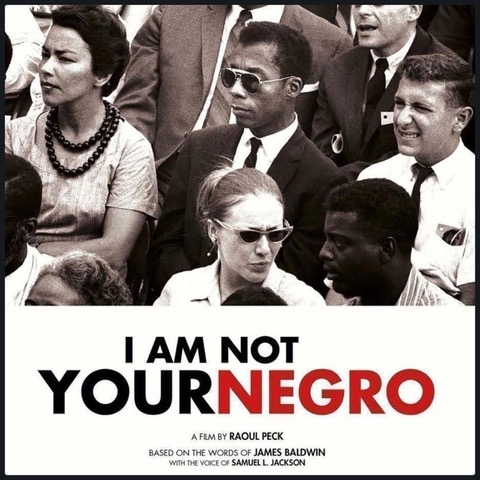
Now comes Raoul Peck to once more exceed these high expectations. Peck is the award-winning Black documentarian who explored James Baldwin’s life in his 2016 film “I Am Not Your Negro.”
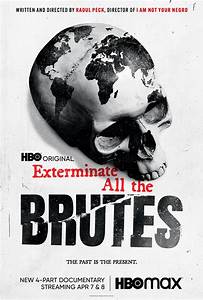
This year he’s out with a powerful documentary titled Exterminate all the Brutes – a gut-wrenching broadside against historic white hypocrisy now showing on HBO Max or at https://www.hbo.com/exterminate-all-the-brutes/episodes.
It’s a film comprised of archival drawings, illustrations, historical documents selected and shown at a rapid clip with sound effects and spot-on musical accompaniments. One powerful device Peck uses is to have the characters (Black, White, Indigenous) whether good, bad or ugly, looking straight out into the camera, wide eyed providing a seldom experienced eerie emotion.
The Baldwin Influence

Before jumping into the four-part docuseries, however, it’s useful to review how Raoul Peck was drawn into the evolution of the lie that is white supremacy. His earlier bio-doc on James Baldwin was the springboard. Critic Robert Ito of the N.Y. Times marvels how Peck reminded us that “Baldwin called Whiteness a ‘metaphor for power’ and called out this country’s legacy of racism in the bluntest of terms.”
“Baldwin is one of the most precise scholars of American society” Peck agreed in an interview. “If you didn’t understand the message, that means there is no hope for you.” Peck does us a huge favor by illuminating Baldwin’s association with Medgar Evers, Martin Luther King Jr. and Malcolm X. He examines the common thread among them and the short window of time in which they were all killed.
Supremacy’s Origins

After producing the award-winner about Baldwin, Peck was exhausted. However he was bothered with the next logical question: How and why did these policies and practices originate? What started Eurocentrism and white supremacy and who were the enablers and spreaders of these notions?
We get Peck’s answers in “Exterminate all the Brutes,” a four-episode sweep across 600 years of Western Civilization.
“The story that he tells is a vast one,” reviews Richard Brody in the April 9, 2021 issue of The New Yorker. For Blacks it is the prime story of the millennia, “that of white supremacy, or more specifically, whites’ presumption of supremacy. A presumption that as he (Peck) makes clear, continues to this day, to be asserted with violence and justified with lies” (Think January 6 at the Capitol.) “What is more, working with historians, Peck puts the very writing of history at the core of the story. He understands history as the victor’s record of events and sees American national mythology as a fiction that depends on an assumed racism.”
“This foundational myth of the “Discovery” of the West’s indigenous people becomes a tale of Western superiority and of white European-justified domination up to and including the extermination of indigenous people and the cultivation of cleared land by way of enslaved Africans.”
The New Yorker’s Brody begs the obvious question — How one can have the audacity to state that they DISCOVERED a land which, upon their arrival, had over 100 million inhabitants.
Film-maker Peck, adds the Times’ Ito, evokes some crucial historical connections that rarely appear in popular culture. For instance, in the myth of the 18th Century’s overlapping ages of ostensible enlightenment and revolution, Peck emphasizes that the French and American Revolutions sought freedom for whites, all the while promoting the subjugation of Blacks , whether at home or in their colonies. This running deceit is artfully dramatized by Peck using authoritative voice-overs and heart-rending dramatic scenes, using real or fact-supported reenactments.
Peck connects a Transgression Trio of African slavery, Native American genocide and the Nazi Holocaust. He traces a connection between Nazism and the rhetoric, symbolism and violence of the current day’s white supremacist. His stated goal is to create a matrix for future study and to inspire activism leading to change.
Peck’s “Exterminate” even gives Donald Trump his due, showing how the former president is a here-and-now “ghost” of slavery. Though officially ended, the ghost lives on in the many complex forms of institutional racism. burdensome.
Imagining the Reverse
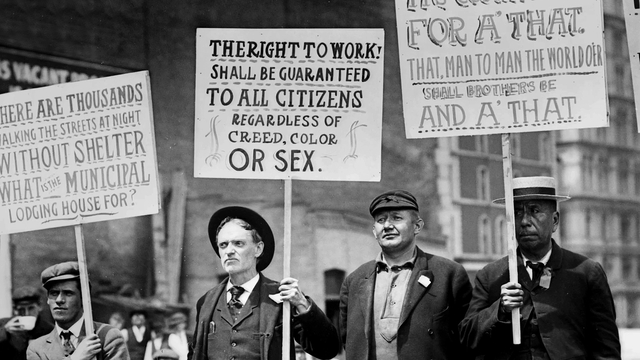
Peck agrees there is no such thing as alternative facts, writes Ito. But he recognizes the selective nature of all historical narratives and the power of controlling the remembered images. He probes deeper truths in some scenes by asking viewers to imagine what history might have been if things had gone in a different way.
Exterminate All the Brutes also delivers some media magic. In one scenario Columbus and his cohorts are killed on the beach by the indigenous people of Haiti. In another we’re shown white children being captured and enslaved by Black slave masters. This role-reversal is a powerful gut-punch. It’s one thing to see Blacks killing white people. But to see the systematic, intentional power of Blacks over white slaves, headed for what we know was the Black slave’s future, this sets the mind racing. How would YOU like this, white America?
Side Lessons
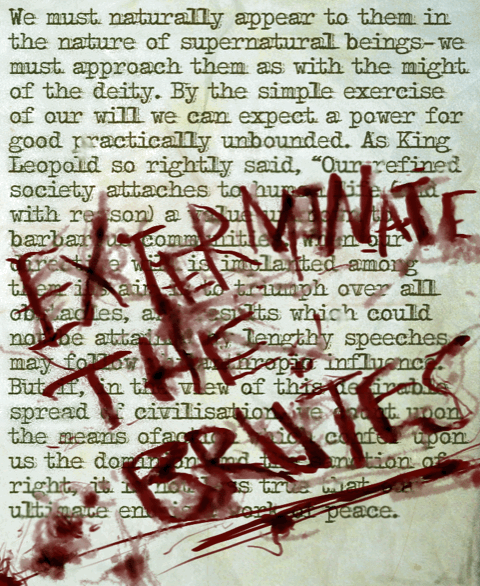
Once you view the documentary, an excellent guide toward appreciating its making would be to watch the conference recently hosted by The Lincoln Center in New York. https://www.youtube.com/watch?v=w7OQ_Yn8ptI
Participants joined from Paris, Uganda, California and New York. Attending were Roxanne Dunbar Coriz, Mahmood Mondani and, of course, Raoul Peck. Among topics considered are the film’s potential impact … and the fate of white Eurocentrism. Some consensus likelihoods emerged:
A. There will be a huge shift in consciousness as a result of this film.
B. There is compelling honesty in the work coupled with the credibility of the storyteller, giving the opus greater impact.
C. Converting 600 years into 4 hours was a hellacious accomplishment, providing those of limited attention span a mammoth opportunity to learn.
D. HBO, aiming a series of this type can help future generations fight ignorance and false narratives, especially with people glued to their phones.
E. With the Trump fiasco still in fresh memory, with immigration surges and white Americans feeling their back up against a demographic wall, the timing of “Exterminate” could not have been better.
F. The world is changing and the U. S. is changing. It could easily be that the next generation, with its majority minority population, will evolve a new world historical narrative with elements of this film as one of its pillars.
Exterminate All the Brutes is a gift that keeps on giving. It’s like Muddy Waters singing Mannish Boy or Luciano Pavarotti singing Nessun Dorma. It’s so nice you’ll want to watch it thrice!
Peck stated that his goal is to provide a framework for future study and to allay the ignorance and disinformation invading the Black community. Given the polarization and racial tension now abounding, understanding some of the original elements of our national discontent is crucial. Are not Republicans now asking President Biden to withdraw the Education Department’s proposal that true Black History be taught in the schools? Are not 39 Republican lawmakers led by Senate Minority Leader Mitch McConnell demanding that Biden drop what they call a “politicized and divisive agenda” fixated on the country’s “flaws?”
This challenge is also aimed at the 1619 Project, a feature launched by the New York Times in which Nikole Hannah-Jones and others reframe the county’s history on slavery and its effects, plus the unsung contributions of Blacks after slavery.
Wrapping Up
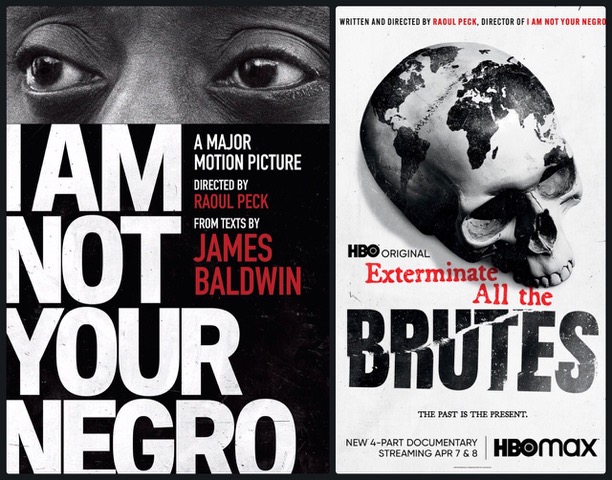
There comes along once or twice in a generation a seminal artistic gem that empowers, enables and informs African Americans. I Am Not Your Negro was one of these. Now Exterminate All the Brutes steps onto the pedestal. HBO has done something that was inconceivable two or three decades ago in making these films available and accessible. This is especially true during the pandemic afflicting the country, when we’re all too tempted to stare at cable TV of dubious significance,
Do yourself a favor and sample Raoul’s Riches.
 Paul King is a construction consultant and member of Chicago’s Business Leadership Council.
Paul King is a construction consultant and member of Chicago’s Business Leadership Council.






